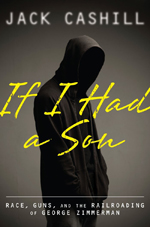How This Philosopher Would Dissect Syria

Jack Cashill's latest:
"If I Had a Son"
Ebook out Sept 1st
![]()
© Jack Cashill
WND.com - September 4, 2013
To restore logic and order to the question of who used chemical weapons in Syria—the forces loyal to Syrian President Bashar al-Assad or the Islamic opposition--I turn to the fourteenth century philosopher, William of Occam. He proposed a theory that makes as much sense today as it did then.
We know it as Occam’s Razor, and it is often stated thusly, “The simplest explanation is usually the best.” The original Latin adds a wrinkle. Said William, “Pluralitas non est ponenda sine neccesitate.’’ This translates roughly, “Multiple variables are not to be posited without necessity.”
Take, for instance, the source of the screams on the night Trayvon Martin was shot and killed in Sanford, Florida. Right up to the guilty verdict and beyond, the Martin family, their attorneys, and the media were insisting that it was Martin who yelled “help” or “help me” fourteen times in forty seconds before the silencing shot.
As to why those screams should be Martin’s, the prosecution never ventured a theory because all explanations posited multiple variables, none of which made much sense.
Martin family attorney Benjamin Crump tried to explain. “You can conclude who is the person crying out for help presumably when they see a gun,” said Crump in his reliably mangled syntax, ignoring the variable that Martin had a fondness for guns and was negotiating to buy one in the last week of his life.
Here are the additional variables that Crump posited: the heavy set George Zimmerman chased the fleet young Martin down, held him at gunpoint, caused him to wail like a banshee for forty seconds at the sight of the gun, and then shot him down in cold blood knowing the police--whom he himself had summoned--were minutes away.
Crump also wanted the media to ignore Zimmerman’s bloodied head and broken nose, the testimony of the one eyewitness who saw and heard Zimmerman screaming for help, and Zimmerman’s first words to the police, “I screamed out for help but nobody came.” Occam, like the jury, would have believed Zimmerman’s account, not Crump’s. It was much simpler, much cleaner, much truer.
Middle East expert Yossef Bodansky and others have argued that on the question of who used the chemical weapons in Syria, presuming they were used, Occam says, “the opposition.” http://bit.ly/17fcB2h
Bodansky documents that weapon storage sites held by the opposition were opened up in the weeks prior to the chemical attack and high-quality weapons were distributed.
Bodansky asks, whether “US Intelligence anticipated such a provocation [chemical attack] and the opportunity for the Syrian opposition to exploit the impact of the ensuing US and allied bombing.” It is a reasonable question.
Like the defense in the Zimmerman trial, Bodansky has a simple and logical story to tell about who did what and why. He complicates it by adding a variable—that is the foreknowledge of US intelligence—but clearly a chemical attack creates a huge potential opportunity for those opposing the Assad regime.
Like the prosecution in the Zimmerman trial, the forces favoring the opposition have a difficult time explaining why Assad might have used the weapons in full view of a world that would be horrified by the same.
Writing in the Weekly Standard, Lee Smith makes an effort to do just that worthy of Benjamin Crump. “Why would Assad be so foolish as to use his unconventional arsenal when a U.N. investigating team is already in the country collecting evidence on past use of chemical weapons?” asks Smith.
His question is better than his answer. “The purpose of waging an attack under the watchful eyes of the U.N.,” says Smith, “is [for Assad] to show his adversaries that the international community, the Europeans, and even the Americans are not going to help them, no matter what.”
In sum, Bodansky argues that the opposition forces used the weapons because they strongly believed their use would provoke a devastating US attack on Assad’s forces. Losing the war at the time, the opposition had everything to gain. There was no down side.
Smith argues that, although winning the war, Assad was prepared to alienate the thinking world and taunt the west to show his adversaries how toothless were America and its allies. That’s a hell of a bet.
“Assad is not a fool,” Smith assures us, but if he is not a fool he should remember what happened when his friend and neighbor, Saddam Hussein, provoked the west.
If not a fool, Assad would put his money, even now, on some kind of military response from the United States. He knows the American media well enough to understand how they will oblige President Obama in whatever he tries to do.
If not a fool, John Boehner will invoke the spirit of William of Occam and demand a much simpler and better explanation from the administration than the one Smith offered in the Weekly Standard, and Smith has offered the best one on that side of the argument that I have seen.

